Tearing the Paper Ceiling: Let Skills Shine

Tearing the Paper Ceiling: Let Skills Shine
Skills are powerful. In its purest form, a skill is the ability to do something well. Let’s take my son’s favorite sport into consideration: soccer. Some skills are natural, like body-balance and coordination. Others are learned, improved, and refined over time, like dribbling, trapping, and teamwork. His favorite player, Sadio Mane of Senegal, has an innate ability, but has also dedicated his focus to develop and perfect his skills over time.
For too long, skills have been overlooked and undervalued in the American hiring process, relying on proxies for preparedness in place of proof of preparedness. That’s why I’m so proud of our friends at Opportunity@Work for their unwavering commitment to rewire the labor market so that everyone can contribute their skills, talent, and energy in pursuit of a better life, an equitable America, and a stronger economy for all.
Tearing the Paper Ceiling and Unlocking Potential for STARs
O@W is galvanizing our nation to Tear the Paper Ceiling and recognize the untapped potential of the 70+ million American workers who are STARs – Skilled Through Alternative Routes. STARs make up half of the U.S. workforce and for decades, have been excluded from good, high-wage jobs. STARs grow skills and knowledge through community college, proven workforce training programs like Per Scholas, bootcamps, certificate programs, military service, on-the-job learning, and more.
According to a recent survey by Indeed, two thirds of job seekers across the nation believe they were overlooked for a job they were qualified for because they did not have the degree listed in the job description. We’re stifling potential instead of unlocking it, creating even greater opportunity gaps.
Because Per Scholas is a tech and essential skills trainer, let’s examine the facts facing our nation’s technology workforce. The most recent jobs report reveals there were 234,000 tech job openings in April, far outnumbering the number of applicants. I’d surmise that many STARs didn’t even apply, seeing a college degree as a minimum requirement to put forth their credentials. It’s disheartening.
As Chief Training Officer at Per Scholas, it’s our learners and alumni who fuel my passion. More than half of our learners are STARs, and the skills they’ve acquired during our 12 to 15 week tuition-free training stand on the shoulders of the skills they already possess: perseverance, time management, tenacity, passion, collaboration, problem-solving and beyond. Plus, they earn a variety of CompTIA certifications – industry recognized credentials that again, prove their mastery of the skills they’ve learned in their training.
Learners like Brittany, who knew a career in tech was for her, and what would provide the economic freedom for her family. Brittany brought resourcefulness, resilience and an inquisitive attitude to her IT Support training every day. She worked the overnight shift, cared for her young daughter, and always arrived to training early, ready to shine.
Hearing stories and experiences like Brittany’s – and thousands of Per Scholas STARs – motivates me in my work, advocating for skills-based hiring.
Solutions for Skills Based Hiring
A year ago, Maryland passed a bill that eliminated degree requirements from thousands of state job postings, far increasing the application pool and ultimately creating more equity. And valuing people for the skills they bring to the table, not the piece of paper. I’m hopeful many more leaders in the public sector will follow suit. I’m encouraged that many private sector companies, from Intel to Amazon and Dell to Google are removing 4-year degrees as a mandatory requirement for a variety of technical roles. This powerful action unlocks potential and creates pathways to a strong middle class.
Employers are the key change agents here, and they win by gaining a more productive and thriving workforce if they’re brave enough to activate skills based hiring. I think Henry Ford said it best: “If you do what you’ve always done, you’ll always get what you’ve always got.” If we continue to exclude talent from the onset, we’ll continue to have hundreds of thousands of open tech jobs each month.
In 12 to 15 weeks, Per Scholas learners graduate from our rigorous, tuition-free tech skills training in a variety of the most in-demand disciplines our tech sector needs: Java Development, Cybersecurity, Software Engineering, IT Support, Salesforce Administration, and more.
It’s the essential skills they refine, like professionalism, perseverance, creative problem solving, and the hard skills they learn like pen testing and networking protocols that make Per Scholas STARs tip-top applicants. Our graduates are ready to make a difference day one on the job.
Let their proven skills training with Per Scholas serve as the proof of preparedness. Let STARs shine.
Tech Jobs Remain Hot, but Diversity Gaps Remain Prevalent
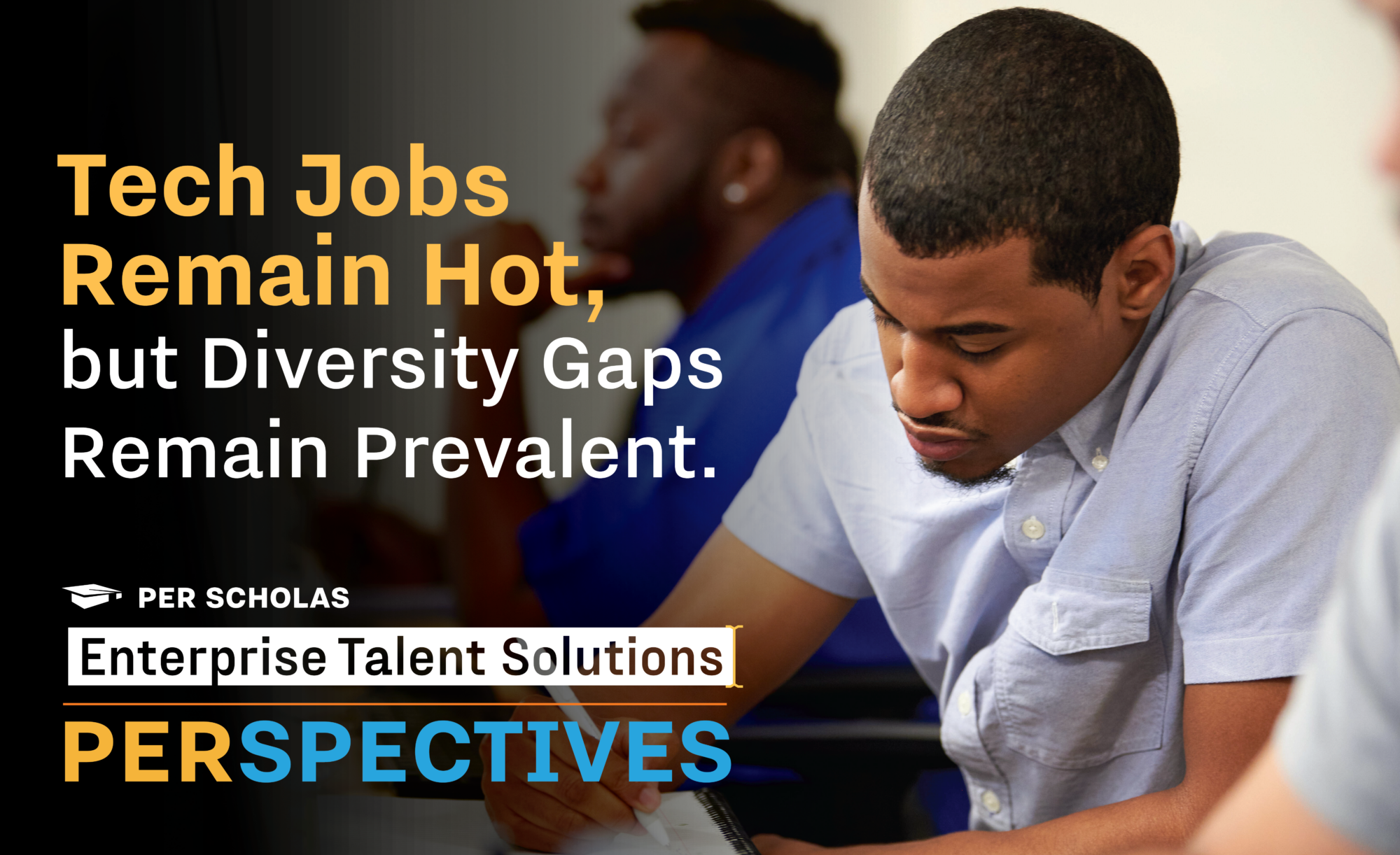
Tech Jobs Remain Hot, but Diversity Gaps Remain Prevalent
A Per Scholas Perspectives Piece from Damien Howard
Despite layoffs in the first quarter of 2023, the tech job market remains hot! According to the April jobs report, there are more than 316,000 open tech roles nationwide. Yet, companies continue to struggle to find the skilled talent to fill these roles. And in my view, many companies are unfortunately still overlooking valuable and performance driven diverse technologists to fill these roles.
Nationwide, Black people only make up 8 percent of the technology workforce, and that percentage is even lower – 3 percent – when you look at Black technologists in the C-Suite. The percentage of women in technology jobs nationwide continues to hover around 25 percent, and again, representation among women of color is at a devastatingly low 4 percent.
My friend Franklin Reed, Executive Director of Global Inclusion, Diversity and Equity at TEKsystems, and I are always innovating solutions on this topic, to achieve our shared goal of a more equitable, inclusive, and diverse technology workforce.
Here are our three major takeaways this April, Celebrate Diversity Month, from TEKsystems’ inaugural Diversity, Equity and Inclusion in IT Report that can help close diversity gaps.
First, IT decision makers believe in the power of diversity. 86 percent of IT decision makers believe DEI programs have made their culture more inclusive, which aids business’s overall ROI and morale. Plus, 74 percent of IT decision makers agreed that DEI has increased their team’s productivity.
“Cultivating a diverse culture starts with a genuine belief that diversity makes us better, followed by intentional recruiting efforts that reinforce this belief,” says Franklin. In this article, Franklin and his colleague discuss a programmable approach to inclusive and equitable recruiting.
Next, there’s tremendous opportunity to implement advanced or mature DEI programs. Less than half (46 percent) of organizations reported having advanced or mature DEI programs, which translates into a missed opportunity for innovation and increased profit for the vast majority. Per Scholas and TEKsystems are leaders in DEI, and can help support your company in developing and implementing powerful talent solutions.
“There is no quick fix to attracting, recruiting, and retaining diverse candidates. Change comes from deep within an organization, and it takes time. It also takes an honest evaluation of where your company currently is with its DEI practices and where the stakeholders want it to be,” Franklin says.
Like Franklin, I often counsel leaders that are looking for different ways to drive revenue that DEI can’t be an initiative or a scattershot effort, but instead, embedded into the DNA of your company, with business metrics and resources to support sustainable success.
Finally, much more needs to be done to support women technologists. There’s a 25 percentage plus point gap between male and female technologists when they indicate their sense of belonging at work, and an even larger gap between men and women related to their perceptions of growth opportunities.
Beyond racial and gender diversity, there are so many other diversity dimensions we must consider and take into account, from neurodiversity to educational attainment, family composition, and more.
So, what’s your take? What are ways your company is closing the diversity gap among your technology workforce? Franklin and I would love to hear from you. Drop a comment below!
The Future is Diverse: How Creating Diverse Teams Will Change the Face of Tech and Promote Profitability
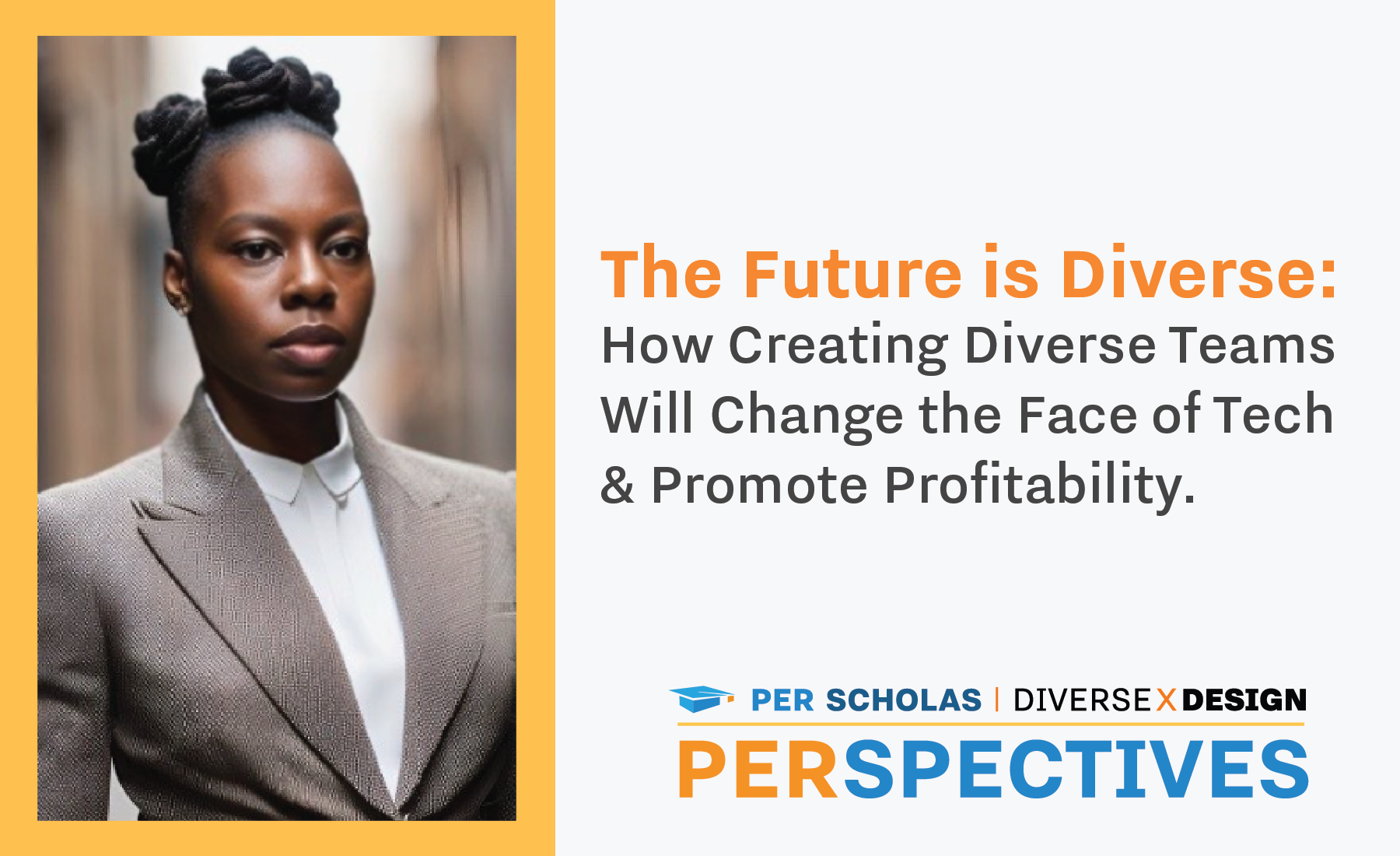
The Future is Diverse: How Creating Diverse Teams Will Change the Face of Tech and Promote Profitability
The past two months have presented multiple moments of reflection and consideration as I have personally thought about Black History Month in February and Women’s History Month in March. With Per Scholas, I have had the opportunity to commemorate these important moments through our Black Futures Month and Women’s Futures Month initiatives, as we bring light to the stark disparities facing Black and women technologists across the sector. I am able to stand on the shoulders of Black women who paved the way for women like me, look back at their accomplishments, and consider what the future holds for both diversity groups with excitement coupled with the understanding that there is still so much to be done.
According to the latest research from Boston Consulting Group, diversity is a key driver of innovation, finding that diverse teams produce a minimum of 19% more revenue. However women in the technology sector continue to hover around 28% of workers nationwide, and Black talent makes up only 8% of the technology workforce. Considering these dire statistics, it’s safe to say that there’s room for improvement in diversifying the tech workforce. I recently hosted Per Scholas’ Black Futures Month and Women’s Futures Month Roundtables and learned so much from my guests. Below, you’ll find my four takeaways.
Black Technologists From Days Passed Remain Motivation for Black Futures
During Per Scholas’ Black Futures Month Roundtable in February, I was joined by panelists Athenia Figgs, Senior Technology Leader at EY; Damien Howard, Per Scholas Chief Enterprise Solutions Officer; and Oche Idoko, Director, Americas, of Cyber, Technology, Data, and Change Risk at Barclays, to celebrate the contributions of Black technologists past and current, as we do our part to create Black tech futures. Our panelists each acknowledged Black technologists they admire, which illustrated the many ways Black Futures are fueled by Black History.
Additionally, as our panelists discussed the work of past Black technologists, we considered our own journeys working alongside the tech industry and how we could diversify the tech landscape for the future. Prior to joining Per Scholas, I found myself being very passionate in advocating for others. That is what led me on my journey to being a DEI practitioner, joining as Senior Director of Per Scholas Diverse by Design last summer. The power we hold to change both the perception and the reality for so many diverse technologists is humbling.
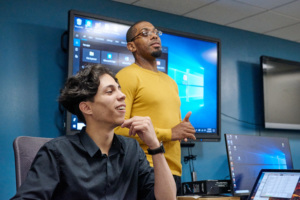
Diversity, Equity, Inclusion, and Belonging are Driving ROI
In recent years, there has been a massive investment into diversity, equity, inclusion, and belonging, and the research is clear. Diversity makes good business sense; so good that McKinsey and Company research revealed that companies in the top quartile for ethnic and racial diversity in management were 35% more likely to have financial returns above industry means. Considering such a high return on investment is incredible, and one that can be achieved when organizations embrace DEIB&C, diversify their workforce, and move forward from announcing diversity initiatives into driving action and results.
One aspect of a company’s return on investment comes from the pillars that diverse teams are smarter and more innovative. A Harvard Business Review article lifts up recent studies that prove diverse teams are smarter, lead to improved group thinking, remain objective, and are more innovative, leading to more revenue-generating opportunities for companies big and small. Another perspective is how diversity gives businesses a competitive advantage. Companies with a diverse workforce can better connect to different customer groups, therefore increasing market share. It’s a key factor in achieving a competitive edge by bringing new perspectives and fresh ideas, increased market knowledge, improved team dynamics, talent acquisition and retention, and better brand reputation overall. Athenia Figgs mentioned, “Companies have tech goals that are linked to outcomes with revenue and efficiency. We showcase the experience of practitioners on teams, and because the team is diverse, results show that they are more stable and have solutions. People come up with interesting solutions because they are a diverse team.” With new perspectives and remembering the history and contributions of past Black technologists, we can enhance Black Futures in tech.

Women Technologists are Diversifying the Tech Industry
This Women’s History Month, we brought to light the best practices, strategies, and solutions to create more Women tech futures. I hosted the Women’s Futures Month Roundtable with panelists Jamie Feldman, Senior Vice President, Enterprise Sales & Account Management at Per Scholas; Maria Medrano, Co-Founder & CEO, Inspirame; and Rashida Ricks, Vice President of Strategic Engagement and Inclusion, CGI Federal. Between all of us women and our involvement in leading the way to create a space for more women to be in tech, I am confident that we will continue to see the number of women in the tech landscape grow.
At Per Scholas, we’re in the business of unlocking potential and changing the face of tech. That’s why this Women’s History Month, we celebrated the contributions of women technologists from past to present for Women’s Futures Month. I’m proud to share that in 2022 alone, Per Scholas trained 1,545 women technologists for high-growth careers, creating strong women futures and contributing to their companies’ bottom lines and their local communities. Nationwide, more than 40 percent of our learners identified as women. But so much more needs to be done.
A Sense of Community, Resources, and Organizational Support Will Take Us to the Next Level
One consistent theme of our Women’s Futures Month Roundtable was community. All of our panelists stressed the importance of “finding your tribe” as women and building a support system from leaders and mentors – both female and male. This was an important takeaway for me because it is important to provide support, understanding, and resources as a business for women to have a sense of belonging and feel important. When women feel empowered and supported, there is nothing we aren’t capable of doing. What made our Roundtable unique was that it didn’t just represent women; it represented minority women. By being part of the Roundtable, we were able to show that Black and Latina women have a place in technology as technologists.
One powerful recommendation I made from Jamie Feldman’s remarks was to join an ERG (employee resource group), and if there wasn’t one that fit what you were looking for, to create it yourself. This sense of community and empowerment is key for leaders in an organization to build so women will thrive at work. The ambition of women is unmatched, and as we encourage more women in the tech landscape to voice their ideas and challenge the status quo, there will be profitability and success for your business, which inspires me as a woman of color.
The Future is Bright!
With the messaging from the leaders from Per Scholas’s Black and Women’s Futures Months Roundtables, I am hopeful for a diverse and inclusive future in tech. There is still work to be done to improve on statistics and DEIB&C initiatives at various organizations, but with the ideas our panelists mentioned and leaders like them working to make a difference in diversity, the future is bright. To see some of my favorite moments from the Roundtables, visit the Per Scholas YouTube page! We have more events like this planned to open the doors for more conversations centered around diversifying the tech landscape – stay tuned for our Hispanic Futures Month Roundtable this fall!
Recession Proofing Your Tech Talent Pipeline

Recession Proofing Your Tech Talent Pipeline
As we reach the final day of the first month of 2023, there has been a lot to unpack with the state of the economy, the labor market, and the future of work. While it may seem like things aren’t looking up for America’s economy despite many recent layoffs, there are still more than 246,000 tech jobs expected to be available in 2023 and massive opportunity for return on talent investments.
Despite the fact that the majority of these layoffs are coming from tech companies, the need to fill tech jobs remains strong for all industries. Whether in finance, real estate, automotive, professional services, healthcare, or other industries, you will still find an abundance of tech roles available within those sectors. With thousands of technologists recently laid off, employers from different industries are eager to hire and train workers for their open IT roles.
Layoffs are happening, but there are still jobs available.
In recent news, Microsoft laid off 10,000 of their employees, joining Meta, Amazon, Google, Cisco, and other large tech companies announcing major layoffs, which begs the question of how companies can retain employees and maintain ROI throughout the year. However, with the tech industry, there are still hundreds of thousands of jobs available with fewer job seekers with the required experience and skills. With so many jobs anticipated in the tech industry, how can employers future-proof tech jobs? Another challenge that C-Suite decision makers are dealing with is having to be more tactical and focused around cost-effective talent acquisition strategies.
Our best advice is to look inward at upskilling and reskilling your current workforce, and then build out a customized pipeline for new tech talent so you can narrow the scope and really dig deep with experienced talent development partners.

Fortunately, Per Scholas is able to do both!
There are many benefits to reskilling and upskilling your current workforce. When you upskill your talent, you are investing in your team, which boosts employee morale, increases production, and is more cost-effective than laying off and hiring new talent. Through Per Scholas’s tech training courses in IT Support, Cybersecurity, Software Engineering, and other customized training tracks, we are providing enterprise solutions to grow and diversify your talent pool. The key is to stop buying talent and start building it.
The need for skilled tech talent remains despite a looming recession.
In addition to employee layoffs, we’ve heard more about an impending recession. This month, two out of three economists predicted a recession this year, alarming corporations and the country as a whole. As we look to our 2023 forecasting, it isn’t all doom and gloom. How can your organization survive a recession and prosper? Diversifying your tech workforce is one important way to start. There is lots of research underscoring diverse workforce improves companies’ bottom line because of the different backgrounds, the dynamic ideas that are developed and the sheer superior talent that exist in this talent pool. It is proven that there is enormous business benefit for companies that invest in a sustainable, diverse talent pipeline that is skilled and has hands-on training.
As I stressed earlier, while there may be a pending recession looming and many big-hitter tech companies are laying off employees, hundreds of thousands of tech roles still remain unfilled. The key to staying ahead is filling your talent pipeline with skilled technologists with hands-on training, in-demand skills, and diverse backgrounds.

Active DEI Programs future-proof the culture and productivity of companies.
When it comes to future-proofing your company, looking inward at your active DEI initiatives can ensure your success throughout a recession. TEKsystems’ recent DEI research showed that 86% of IT decision makers believe DEI programs have made their culture more inclusive, which aids business’s overall ROI and morale. Simply put, employees with a good outlook on the company they work for will do better work; and if the workforce is diverse, then there will be more productivity, greater ROI, and greater span of ideas for growth and development.
Additionally, 74% of IT decision makers agreed that DEI has increased their team’s productivity. The catch is putting ideas and programs into action in order to future-proof your business. Creating systemic changes throughout your organization will ensure happy, productive, and diverse team members that will help your overall bottom line.
The future of the economy may be unknown or headed toward a recession, but that does not mean a downfall for your company. Now is the time to stop buying talent and start building it. Let Per Scholas help you focus on the development and upskilling of your current team so you can build the talent you need to succeed and put action into DEI programs to support your company’s bottom line and return on investment.
Forecasting a Cost-Effective, Diverse Tech Industry for 2023

Forecasting a Cost-Effective, Diverse Tech Industry for 2023
Another year is coming to a close with an IT industry that still hosts hundreds of thousands of job openings with little diversification, meaning there are hundreds of firms not realizing the increased revenue performance that accompanies a diverse workforce. I look to recent research from TEKsystems about diversity, equity, and inclusion to illustrate what the future of tech looks like across America and how it will create profit for businesses.
To put it simply, the tech sector has an opportunity to be diverse and increase revenue performance, we just have to put commitments into action. Creating a work environment that is equitable and inclusive for everyone, while setting your firm up for deeper performance outcomes that you would not realize otherwise, is pertinent when hiring diverse talent. With Per Scholas’ industry outlook and TEKsystems’ DEI data, the hiring landscape in the tech industry can improve for the better.

What does the tech industry look like?
The tech industry is one of the fastest growing industries in the country that, despite an impending recession and major layoffs, has continued to provide job openings for technologists. Such uncertainty has led to pressure on leadership to deliver results and prioritize the top projects, with a greater importance to deliver on vital IT initiatives like digital transformation and tech strategies. In a strong industry with hundreds of thousands of job openings throughout the country, the need for diversity and filling those jobs with skilled, diverse individuals will benefit overall business performance and productivity for high-performing firms and positively impacting workforce and economic equity.
I think DEI efforts have made positive impacts on organizations, but there are still major diversity gaps among IT talent. TEKsystems’ report demonstrates a clear disconnect between perceptions and the reality of solutions meant to cultivate a diverse, inclusive culture. While many organizations have demonstrated their commitment to DEI initiatives and seem to understand the importance, they appear to be failing to make systematic changes that generate results. While 73% of IT decision-makers say DEI has increased (team) productivity, only 46% of organizations have advanced or mature DEI programs in place, meaning there is a missed opportunity for innovation and profit in the industry.
We need to invest in dependable resources and sustainable tech talent pipelines.
Tackling systematic change in the IT industry involves purposeful, innovative approaches powered by partnerships across enterprises. We believe these approaches, however, are not independent from an organization’s business goals—they align and help to empower business. Studies have shown inclusive teams make better decisions, and diverse teams produce more revenue. In partnership with TEKsystems, we’re working to build tech talent pipelines to help accelerate business outcomes, and we’re increasing access to opportunity through rigorous technical training across the U.S., equipping thousands of immensely qualified and diverse technologists with the in-demand skills to succeed.

By investing in tech talent pipelines that are diverse and purposeful with DEI work, the tech industry will lead with increased innovation and productivity. Diversity is good for business, individuals, and the economy, so why not put leaders’ words into action by hiring skilled, productive, and diverse technologists for the thousands of job openings in the tech industry?
The future of technology shows opportunity for diversity — especially with women in tech.
The TEKsystems DEI research shows that there is tremendous opportunity for investment in the upcoming year for women in the technology sector. Here are some key details from the research that highlights stark differences between women and men in tech:

- 45% of women indicate DEI programs have positively impacted their career, as compared to 70% of men.
- 55% of women feel they have growth opportunities at work, as compared to 89% of men.
- 58% of women have a sense of belonging at work, as compared to 85% of men.
- 4 out of 10 women don’t believe they receive fair compensation for their work, presenting an opportunity for organizations to improve their workplace experience.
With disparaging results, companies need to focus on DEI programming that helps all team members and programs effectively change the culture to be more inclusive of women in tech. Per Scholas, in partnership with TEKsystems, aims to increase access and opportunity by training entry and mid-level IT professionals for high-growth careers. With the creation of Per Scholas’s Tech Women of Color cohort in Columbus, the Women in Software Engineering cohort in our National Capital Region campus, and our current year’s learners sitting at 40% women, we are paving the way for diversity in tech for women.
Our Boldest Experiment Yet: Satellite

Our Boldest Experiment Yet: Satellite
New York City is awash with talent, attracting droves from around the globe. Yet, access to the vast array of opportunities within the city remains uneven – and even inaccessible – to all. One of the biggest barriers that exist in the nation’s largest city is commutable distances between boroughs. Entire communities within New York City remain cut off from prosperity geographically, culturally, and economically. The recent COVID-19 pandemic, the accompanying economic downturn, and the present rebound have made stark some of the persistent inequities in the city, prompting calls for action from City Hall, the business community, and others to ensure New York’s recovery is centered on equity and economic mobility.
In perhaps our boldest experiment yet, Per Scholas has launched our Satellite Model where we embed our programming with a partner organization’s physical location and harness that entity’s connections with the local community, complementary services, and staff to expand access to high-quality tech training and careers. This hybrid approach to training offers remote instruction from Per Scholas’s Bronx or Brooklyn campus to learners in East New York, Manhattan, Queens, and Staten Island. I am so proud that for the first time in our organizational history, we are training in all five boroughs.
Learners enrolled at a Satellite location experience the same programming and are held to the same high standards as those enrolled at Per Scholas. Staff from Per Scholas and Satellite organizations work collaboratively to provide professional development, learner support, exposure to the tech industry, and career planning and job search assistance.
Partnering for Impact
Through the generous support of our Founder’s Circle partner Barclays, we’ve developed a report assessing the Satellite Model’s structure, promise, and early learnings. The Satellite Model is designed to tap into and uplift both the New Yorkers who are far too often overlooked as potential technology talent, as well as the rich but fragmented ecosystem of workforce organizations and programs operating in areas of the city that are less accessible geographically to Per Scholas’s campuses.
Here were our key findings:
- The Satellite Model is broadening Per Scholas’s reach into new communities and addressing unmet demand for locally accessible tech training.
- Learners to date receive what appears to be an equal training experience.
- The Satellite Model incorporates an extensive scaffolding of capacity-building supports to set partner organizations – and the partnerships – up for success.
- A Satellite “ecosystem” is taking shape, linking Satellite partners to one another as well as to Per Scholas.
- Per Scholas and its Satellite partners are building a compelling story about collaborative outcomes and impacts.
- The Satellite Model holds promise for achieving greater efficiencies in staffing and costs in the long run but will necessitate Per Scholas staff to play significant roles in program implementation and administration for longer than anticipated.
National Potential
“The Satellite Model allows for Per Scholas to meet the growing demand for tech training and will help more individuals launch upwardly mobile careers,” said Deborah Goldfarb, Global Head of Citizenship for Barclays. “Critically, Per Scholas will be able to further break down barriers and create access for learners across New York City and beyond.”
The Satellite approach could have national implications in the future, beyond New York City. It might prove to be applicable in a market covering a large geographic area with sufficient tech employment opportunities dispersed throughout. If an appropriate community organization in a suburban or rural area can be identified to partner with the Per Scholas campus in a central business district, the Satellite Model is one promising strategy for increasing access to training for more prospective learners.
Partnering for Impact: The Per Scholas Satellite Model
Following Your North Star

Following Your North Star
by Damien Howard
Chief Enterprise Solutions Officer
In my role as Chief Enterprise Solutions Officer, I often talk to C-Suite leaders, and one of the top challenges that always arises is hiring and retaining diverse tech talent. According to McKinsey & Company, inclusive teams make better decisions up to 87 percent of the time, and diverse teams produce a minimum of 19 percent more revenue. The business case and ROI for diversity has never been stronger or more urgent.
In my conversations with C-Suite Leaders, I also often get asked about what to do when an organization struggles with diverse hiring. They ask me how to catch up. My response is always to start with listening, learning, and then you must move to action! I also just heard a great quote from a phenomenal leader at E&Y in response to this question and he said, “You need to take luck out of the process when hiring diverse candidates.”
North Star Luminaries
Recently, I had the distinct privilege of honoring four leaders with our Diverse by Design North Star Award. Much like the North Star, this collection of leaders serves as a beacon for others to follow in their Diversity, Equity, Inclusion, and Belonging (DEIB) journey. Their commitment to DEIB and diversity hiring is bright and inspirational.
Among this year’s recipients was @Michael Buckham-White, Global Managing Director at @Deloitte Technology and Chairperson of the @ ITSMF Board. Michael takes on the role of Global Managing Director for Deloitte Technology and leads Global Consulting, Advisory, and Brand technology efforts. He ensures customers get the best of IT across a broad suite of capabilities, and serves as the single point of contact on technology needs. I’ve been lucky enough to see Michael in action at ITSMF for the last couple of years and have been able to see his impact in DEIB firsthand. Michael is known across multiple industries and has even been acknowledged by Savoy magazine as one of the 300 Most Influential Black Executives in Corporate America.
I presented the next Diverse by Design North Star Award to @Stephen DeStefani, SVP of Technology Diverse Segments, Representation & Inclusion at @Wells Fargo. In his role, he established and leads Wells Fargo’s first Neurodiversity Program and currently leads the Enterprise Technology efforts to hire more than 300 neurodiverse candidates by the end of 2022. He also led the effort to re-establish the Diversity Equity & Inclusion program for the Technology organization and built the operational framework for all diverse workstreams for the program. Stephen is also the executive sponsor that pushed Per Scholas’ customized talent development solution forward at Wells Fargo. We are now on our fourth training cohort and we are slated to launch three more in 2023. Stephen is a champion for DEIB.
Our third Diverse by Design North Star honoree was @Janet Pope, Vice President of Corporate Social Responsibility at @Capgemini Global Consulting Group. In her role, Janet is responsible for continuing to cultivate a culture of inclusion at Capgemini by developing, leading, and implementing workforce engagement strategies and programs that align directly with the business strategy, support people, protect the planet, grow partnerships, and embody overarching corporate values. To date, Capgemini has hired more than 80 Per Scholas graduates.
And finally, we honored @Pittsburgh Steelers Head Coach Mike Tomlin with the North Star Award. His commitments to the @NFL kept him in Pittsburgh, but my Diverse by Design Co-Founder Ken Walker and I had the chance to meet Coach on his home turf to present him with his award. Take a look here. As one of five minority head coaches in the NFL, Coach Tomlin is a passionate advocate for DEIB. He actively promotes racial equity and intentional progress around challenges attached to diversity, equity, inclusion, and belonging. Coach Tomlin is a tenacious leader, showing this generation just what’s possible.
Let Per Scholas Be Your Solution For Superior & Diverse IT Talent
For more than 27 years, Per Scholas has been an industry leader that partners with companies to recruit, train, and build sustainable diverse tech talent pipelines to solve business pain points.
Per Scholas Enterprise Talent Solutions provides our employer partners solutions for both attracting and retaining talent. Our emerging talent solutions provides companies with a steady stream of high-quality candidates with job-specific skills tailored to meet real time hiring demands. We build local training operations across the country and offer remote training courses for distance-learning.
For incumbent talent, our upskilling solutions offer short term, intensive skills training to help businesses give employees new or enhanced skills, and our reskilling solution offers immersive technical skills training for employees to enter new technical roles.
We close the equity gap and increase opportunity through rigorous technical skills training. We partner with nearly 1,000 companies from Fortune 100 to innovate start ups to provide the tech talent they need in today’s hot job market.
This year, we’re on track to train nearly 4,000 diverse technologists in in-demand skills your company needs from cloud computing to java developer, cybersecurity to AWS re/Start and beyond. Aligned with our commitment to diversity, equity, inclusion, and belonging, 85 percent of our learners are people of color and more than a third identify as women.
Per Scholas is committed to solving your IT talent sourcing challenges and we look forward to partnering with you in meaningful ways to do just that.
Clear Connections
Clear Connections
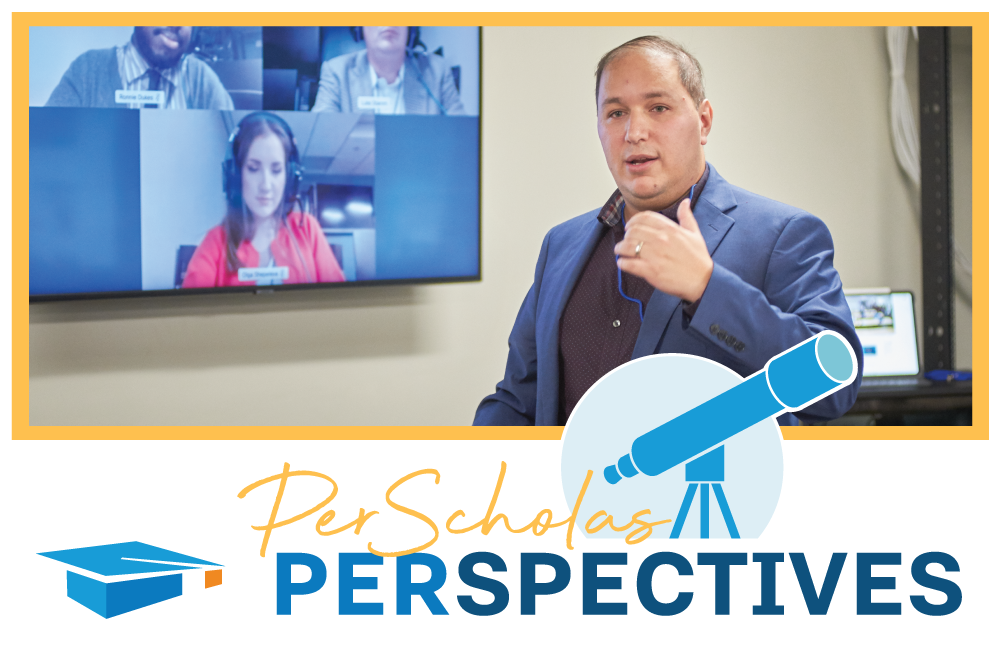
Clear Connections
by Eduardo Hernandez
Senior Vice President, Training Quality, Tech and Innovation
Like so many, my world was turned upside down in March 2020 at the onset of what would become the COVID-19 global pandemic. I had to navigate a move for my parents, and remote schooling for my daughter, while grappling with the uncertainty of Covid 19.
Professionally, as the VP of Technology and Training Innovation at the time for national tech skills trainer Per Scholas, I had a lot to worry about. There were more than 500 learners enrolled in active courses in more than 30 classrooms in cities across the nation, from Dallas to Greater Boston and beyond. Like all other institutions, we shut our physical doors, but had an obligation to our learners to keep courses going. Remote learning was at our doorstep, and we innovated and tried our very best to keep training going.
We didn’t really know whether our migration to remote learning would be successful. Yes, we had been testing some hybrid models pre-pandemic, and were set to pilot them in February 2020, just before the pandemic hit. Our intensive 12 to 15 week boot-camp style training experience is not easy, even when learners can practice hands-on skills in modern computer labs stocked with best-in-class hardware and software. It was difficult for my team to imagine how learners could master all the training material in remote classes, especially given the distractions learners faced at home. Plus, the majority of our learners didn’t have adequate technology at home, from laptops to broadband. Complications abounded.
“We had no idea how learners might fare in a 100 percent remote framework, only that we had no other options,” reflected Per Scholas President and CEO Plinio Ayala. “But we also knew that we had been presented with an unusual opportunity to explore the capabilities and limits of remote learning in ways we had scarcely imagined would ever be possible.”
Informed Innovation
Prior to COVID, Per Scholas had accumulated high-quality research evidence demonstrating the long-term efficacy of our training. We are one of very few workforce development organizations that has undergone two randomized control trial impact evaluations. These comprehensive, multi-year studies generated robust proof that our pre-COVID-19 career preparation model raised income, reduced use of TANF, SNAP, and unemployment insurance benefits and increased overall life satisfaction.
But in mid-March 2020, we needed a 100% remote training model that we could implement within two weeks. There would be no time to evaluate it beforehand. Instead, we had to learn as we went, remaining flexible and innovating at all costs. So we did our best to build in a robust feedback loop, leveraging learnings in real time to build program model strengths and address challenges.
From our first week of our migration to remote learning, my staff adapted and administered multiple surveys to generate organized feedback from remote learners and faculty members and used those learnings to adjust our approach in real time. Just eight weeks into the next experience, we switched to a different video communications platform, began to vary the learning activities scheduled for each day, provided assistance for learners who lacked adequate technology, and developed supports for instructors who initially struggled to adjust to remote training delivery. These early changes fostered immediate improvements in learner engagement and outcomes, but also highlighted the need for Per Scholas to continue learning from our experience.
Teaming up with Barrow Street Consulting
Accordingly, once our trainings had begun to stabilize again, we teamed up with our friends at Barrow Street Consulting (BSC) to lead a sustained remote learning evaluation effort. BSC had two overarching questions we asked them to look at: First, how learners and staff experiencing the sudden transition to remote learning and subsequent rapid program changes, and second, how remote learning outcomes changed over time.
With a mix of mid- and end-point course surveys and focus groups, BSC research revealed that remote learning at Per Scholas was achieving graduation and certification outcomes that closely aligned the organization’s pre-COVID-19 norms but had not yet equaled them as we neared the end of 2020. So, we innovated and created a centralized, national Remote Training Team, essentially creating a virtual campus that would eventually be led by a managing director.
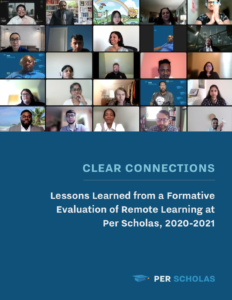
One year later, BSC repeated its collection and analysis of implementation data and began studying outcomes for the remote learners we had enrolled to date. It had found significant improvements in graduation, certification, and job attainment between 2020 and early 2021. Plus, since we were open to making changes and implementing modifications we believed would benefit our learners, those in the 2021 cohorts expressed greater satisfaction with Per Scholas than those in 2020 cohorts. Our remote offering was working!
Keys To Success: Equitable Access, Instructional Excellence, and Learner Support
I believe there are three keys to our success: ensuring equitable access to remote learning, a strong focus on instructional excellence, and providing a wide range of new learner supports. The overwhelming majority of Per Scholas learners come from households with incomes lower than the median in their respective region. We quickly learned that a significant share of learners lacked minimum technology requirements of training from home. Our team was quick to raise funds to close this digital divide and in 2021 provided hundreds of technology kits to our learners to ensure success. Eighty-five percent of learners reported that the tech kits made their course material easier to understand. Ensuring every single learner enrolled in training had the tools they needed to succeed from home was essential as we ensured equitable access.
Another challenge we faced early on was from our faculty – technical instructors, career developers, and instructional associates. Suddenly they were being asked to teach curriculum from home, not the state-of-the-art classrooms they were used to while also navigating new responsibilities like caring for young children and their families at home. When the pandemic first began, our faculty in all three categories struggled with the new format. Over time, Per Scholas provided professional development, home-based technology, and many other supports to bridge the gap. According to analysis by BSC, 100 percent of responding instructors and career coaches reported that they had improved remote instruction and the majority “to a great extent.” Our focus on instructional excellence remains.
The third key area of focus for Per Scholas during this transition to remote learning was Learner Support. COVID-19 greatly increased the number of learners confronting psychosocial, health, and economic challenges to a significant degree. Before the pandemic, we provided these types of services at our New York City campuses including dedicated learner support managers and financial coaches. Other campuses often partnered with community-based organizations to address learners’ needs. Understanding the strain that COVID-19 had, Per Scholas quickly realized we needed to nationalize our learner supports for all Per Scholas learners to be able to access. Our organization quickly stood up robust remote learner support services, including individualized learner counseling, referrals, benefits advocacy, and financial coaching. Since March 2020, our Learner Support Team has logged thousands of meaningful encounters with hundreds of Per Scholas learners. Today, the team’s national reach and enhanced capabilities are permitting us to consider implementing even more comprehensive learner supports in the future.
Remote Learning is Here to Stay
Per Scholas initially conceived a remote learning model as a temporary response to an extraordinary circumstance, but it has been abundantly clear that we’ll continue to train in both on-campus and remote learning settings. A large majority of our potential learners prefer it. But in order to do so, we need funders and policymakers to provide funding and resources for adult education and training providers to continue evolving and improving remote programs; support formative, participant-centered evaluations, like the kind BSC conducted for Per Scholas; and to provide additional supports for programs to remove access barriers affecting remote learners. Plus, professional development for educators is key. Many teachers and instructors experienced a jarring shift to remote instruction, and Per Scholas found that an expectation of simply flipping the switch wasn’t going to be sustainable.
For our part, Per Scholas is committed to evolving our remote learning model, including variations like hybrid – meaning some in-person and some at-home instruction as well as leveraging our powerful Satellite Model of training individuals closer to their homes. In my role as Senior Vice President of Training, Quality, Tech, and Innovation, I welcome the opportunity to continue the conversation about our successes and challenges and to create a community of practice with other providers to enhance our abilities to train our learners in remote settings.
